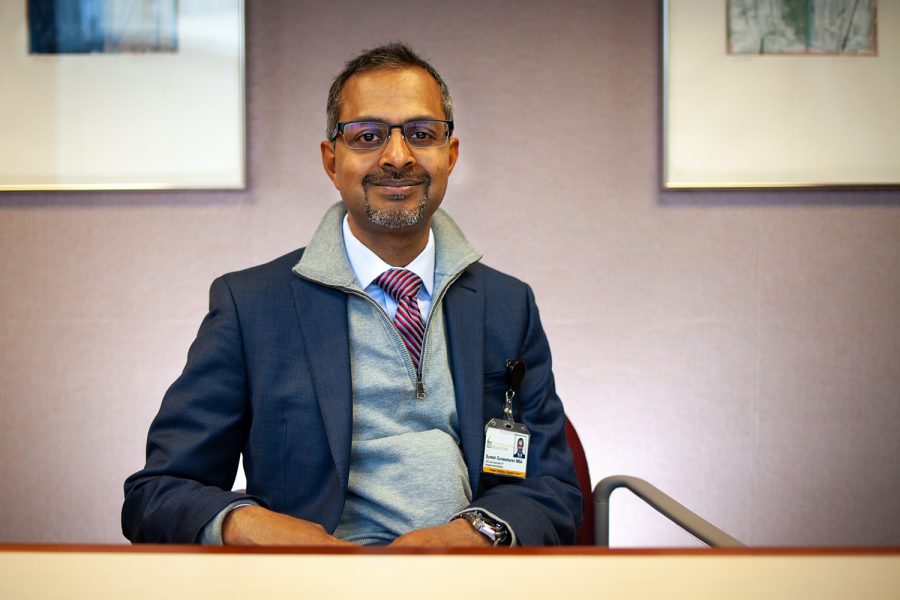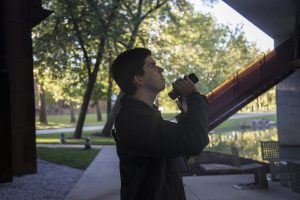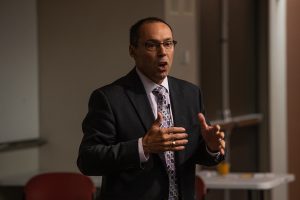New UIHC CEO addresses achievements, issues for hospital
The new UIHC CEO Suresh Gunasekaran is planning to foster relationships across campus and across the state.
UI Hospitals and Clinics CEO Suresh Gunasekaran sits at the University Main Hospital on Dec. 3, 2018.
December 4, 2018
After nearly 20 years at the University of Texas Southwestern Medical Center, new UI Hospitals & Clinics CEO Suresh Gunasekaran jumped at the opportunity to land in Iowa City because of the University of Iowa’s national reputation for excellence.
Since his appointment in November, Gunasekaran has begun to address issues facing UIHC, the most pressing of which was a lack of space and staff to meet the demands of patients, he said.
“Most days, we regret that we’re unable to provide all the services that are asked of us,” Gunasekaran said. “What we try to do is maximize what we have for the benefit of the community, but it is an increasingly stressful process.”
Although many academic medical centers seem to struggle to attract patients nationwide, Gunasekaran said this is not an issue for UIHC.
“We have to use our resources judiciously, but we also have to understand that if we’re going to continue to meet our obligations, we have to grow,” he said. “I’m really optimistic that over the next five to 10 years, we will better meet everyone’s demands.”
With an increase in the number of patients comes an increase in waiting time and, in turn, increased business for staff members. Gunasekaran said he believes taking care of UIHC faculty, nurses, and other providers is a priority.
RELATED: Brooks Jackson addresses UI Health Care strategic plan
He noted that UI Health Care competes nationally for the brightest minds in research, teaching, and patient care in an effort to advance in great technology and opportunity.
“Although this place is really big nationwide, it’s small enough you can feel the difference you make in people’s lives,” Gunasekaran said. “That kind of a strong community that takes pride in taking care of one another — that’s extremely appealing.”
In addition to meeting and getting to know UIHC staff and patients alike, Gunasekaran said UI Health Care values the relationship between UIHC and the Carver College of Medicine, and looks forward to developing it further.
“We want to continue to make sure that our learners have really awesome opportunities to train,” Gunasekaran said. “We offer so many different settings for residents and students, even ones not in Iowa City.”
This will be a major area of focus, he said, and allow UI students and residents to practice at clinics, private practice models, and community health centers.
Gunasekaran emphasized that another way to encourage learning and nurture UIHC’s relationship with Carver is through clinical trials, whether that be in cancer, neuroscience, or different areas.
“With this kind of collaboration, we’ll be able to give all Iowans really complete access to trials that otherwise you’d have to leave the state for,” Gunasekaran said. “We really value being part of the larger UI community.”
Gunasekaran said there is a growing concern that more complex cases usually handed off to UIHC by smaller hospitals are now being retained by growing medical centers statewide. In response to this concern, he said he would like to develop partnerships with communities throughout Iowa.
“We look for relationships where patients can get the care that they need close to home, but when it gets more complicated they can come here for a procedure,” Gunasekaran said.
Patients staying in their own communities for medical reasons is a national trend and very reasonable, Gunasekaran said. UIHC will continue to grow outward by collaborating with physicians and hospitals in those areas.
“We’re not going to be measured by the number of buildings we have across the state,” Gunasekaran said. “We’re going to be measured by the communities we impact.”







